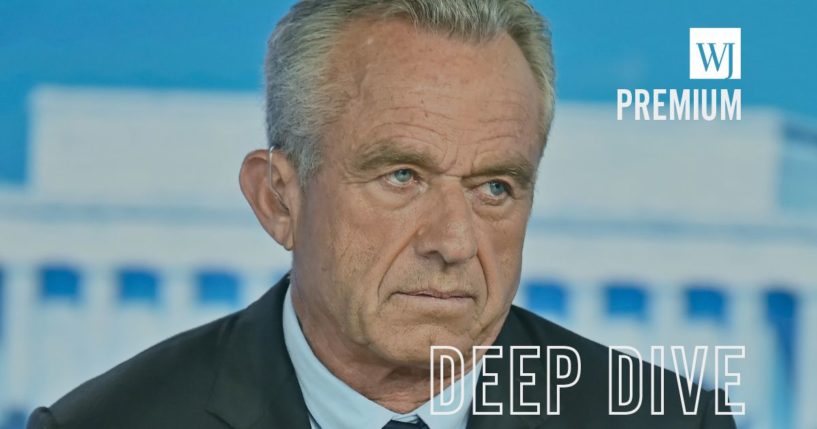
Robert F. Kennedy Jr.: The Good, the Bad and the Ugly
Democratic presidential candidate Robert F. Kennedy Jr. has made inroads with nearly one-fifth of his party’s potential primary voters, and many conservatives have also shown support for the political scion.
But in spite of his redeeming qualities, of which there are many, it is important to remember that at the end of each and every day, the 69-year-old environmentalist is a very liberal man.
If he weren’t, he would be campaigning as either a Republican or with no party affiliation at all.
While he is certainly not a leftist, Kennedy is far from a conservative and is much further to the left than his campaign for “reconciliation” would have people believe.
It is appropriate to argue that he represents the Democratic Party of the last century – before it was overtaken by “democratic” socialists, anti-Semites and an overall obsession with identity politics and extreme gender ideologies.
But the party of Franklin Roosevelt and John F. Kennedy was extreme in its own right. A relic of its past is on the stump, and he is making a lot of new friends.
To many voters, RFK Jr. comes off as a sensible choice for president. But is that only because the rest of his party has gone off the deep end?
The Good: COVID Policy, Free Speech and Common Sense
Former President Donald Trump recently was asked for his opinion of Kennedy. He offered a cordial response.
“He’s a common sense guy and so am I,” Trump said. “So, whether you’re conservative or liberal, common sense is common sense.”
Kennedy does appear to possess uncommonly good sense for a Democrat. It is very easy to hear his message and come away feeling impressed.
He is one of few Democrats who have been sidelined by Big Tech’s politically motivated sensors — which puts him in good company with those of us who have navigated censorship for years.
Kennedy also purports to be a free speech absolutist. He has been saying since before he launched a campaign to challenge President Joe Biden for the Democratic Party’s nomination for president that he is against both censorship and collusion between big business and big government to enact it.
RFK Jr. stringently opposes the practice of environmental, social and corporate governance in banking, or ESG.
In May, he tweeted, “The ability to save and spend without political interference is a prerequisite for the exercise of meaningful dissent, and I will defend it accordingly. This is not a right- or left-wing issue. It is about protecting democracy from powerful established interests. The digitization of currency has given government unprecedented powers to surveil and control economic life.”
Kennedy continued, “That is why I oppose [central bank digital currencies], which will vastly magnify the government’s power to suffocate dissent by cutting off access to funds with a keystroke. That’s also why I support bitcoin, which allows people to conduct transactions free from government interference. Bitcoin has been a lifesaver for people’s movements around the world, especially in Burma.”
If a potential voter were to read that quote alone and be told it was said by a candidate such as Republican Gov. Ron DeSantis of Florida, that person would have no reason to question it.
Kennedy is also against compelled vaccinations, such as those seen during the COVID-19 pandemic, and opposed to forever wars and trade deals that put Americans last.
When looking at the aforementioned issues, it is easy to see RFK Jr.’s appeal. A gadfly to his party’s leadership, his candidacy has been delightful to watch as it has stirred some very undemocratic elements within the Democratic Party.
Tucker Carlson dedicated an episode of his Twitter show last month to Kennedy’s disruptive candidacy:
Ep. 6 Bobby Kennedy is winning pic.twitter.com/jW51PYahLV
— Tucker Carlson (@TuckerCarlson) June 22, 2023
The Bad: Abortion, Gun Rights and Big Government
While Kennedy is on the right side of a lot of issues, let’s take a look at a few where there is zero overlap between him and most conservatives.
He is or has been in favor of:
• Abortion.
• Gun control (the candidate said last month he does not believe firearms are the root issue of gun violence, but he would sign legislation to ban so-called assault weapons if legislation came across his desk).
• Same-sex marriage.
• Punishment of businesses that reject climate change narratives.
• Amnesty for nonviolent drug offenders (in the midst of a deadly fentanyl crisis).
• Limits on mining, logging and oil drilling.
• Limits on the refuge of safe communities for people who wish to live away from crime — or, as his campaign website puts it, “curbing … suburban sprawl.”
RFK Jr. once wrote that corporations that “deliberately, purposefully, maliciously and systematically sponsor climate lies should be given the death penalty.”
His positions on other issues are completely unavailable or intentionally vague. Kennedy’s website shows he is running as a big-picture guy.
He offers voters a myriad of wonderful destinations but offers no roadmap on how he intends to get Americans to those places.
For example, one passage on Kennedy’s campaign site reads:
“Everyone wants their children to be safe. Few relish the thought of dead fetuses, nor do they want to force women to have unwanted babies. Everyone wants safe streets, yet few wish for millions of people to languish in prison. Robert F. Kennedy will draw on the broad moral agreements beneath our divisions. He will model careful listening, and create conditions where each group can hear the stories of the other. He will lead the way toward national reconciliation, respectful dialog, and willingness to change, to grow, and to forgive.”
A few read-throughs of the carefully worded excerpt show us Kennedy’s extreme side.
“Dead fetuses” is a softer, gentler way to say “murdered babies.” It is dehumanizing language that makes one wonder whether RFK Jr. believes human life begins at birth.
Meanwhile, he views millions of people who are incarcerated — many for egregious crimes — as victims who “languish in prison.”
Someone who is locked up for doling out fentanyl that decimates families is exactly where he or she belongs.
It is not clear what “willingness to change” means, but much of the Democratic Party is currently attempting to rewrite history, biology and economic terms.
This group is not tolerant of those who stand to protect science and semantics.
Kennedy’s website is jam-packed with messages that are vague but reveal potentially startling messages.
In fact, a thorough review of RFK Jr. reveals his only true upside is that he is not in lockstep with his party on most of its more extreme positions.
While it is not common in today’s political climate to hear rational words come out of the mouth of a Democratic candidate for the presidency, Kennedy is and always has been a very liberal man.
Conservatives who might be inclined to support him or are captured by his message must remember that — even if much of what he says is striking in its lucidity.
To be clear, the attorney and environmentalist is a long shot for the White House. But in the event his candidacy somehow prevails against extreme odds, it is important we understand who he is and where his loyalties lie.
The Ugly: The Supreme Court
Associate Justice Clarence Thomas, the gold standard of jurists, turned 75 last month, while Associate Justice Samuel Alito will celebrate his 74th birthday next year.
If Thomas’ seat became vacant during a Kennedy administration, would Kennedy seek a replacement with a similar mind?
Would Alito’s chair be vacated only to be filled by a meddling, far-left judicial activist? Would RFK Jr. find someone to match Thomas and his purist interpretation of the law?
That is extremely doubtful, as not only is Thomas one of a kind, but we have no idea what kind of justices Kennedy would nominate to the country’s high court.
All those aboard the Kennedy train should ponder what kind of person RFK Jr. would nominate in place of either man and then decide if they want to continue down the tracks or if they should get off at the next stop.
The next president must be someone who favors the legal mind of someone like Thomas over someone such as Associate Justice Ketanji Brown Jackson.
The ugly truth is the Supreme Court could play a major role in 2024 and beyond. Voters who are hearing Kennedy’s message are in the dark about who his ideal jurist is.
Perhaps he hasn’t yet gotten around to discussing the topic, or perhaps he doesn’t want to. The coalition of support he has built is broad, and his candidacy relies on him staying on message about civil liberties.
There is no denying RFK Jr. aligns with conservatives on some really key issues.
But there is a reason he is running for president in a party that twice put every available roadblock in front of Sen. Bernie Bernie Sanders of Vermont.
Kennedy is either running a protest campaign — which means he’s not serious — or he’s too liberal to run as anything other than a Democrat.
In either event, the crowded Republican primary field offers voters candidates who check all the right boxes but carry none of the baggage that comes with someone like RFK Jr.
Truth and Accuracy
We are committed to truth and accuracy in all of our journalism. Read our editorial standards.
Advertise with The Western Journal and reach millions of highly engaged readers, while supporting our work. Advertise Today.











